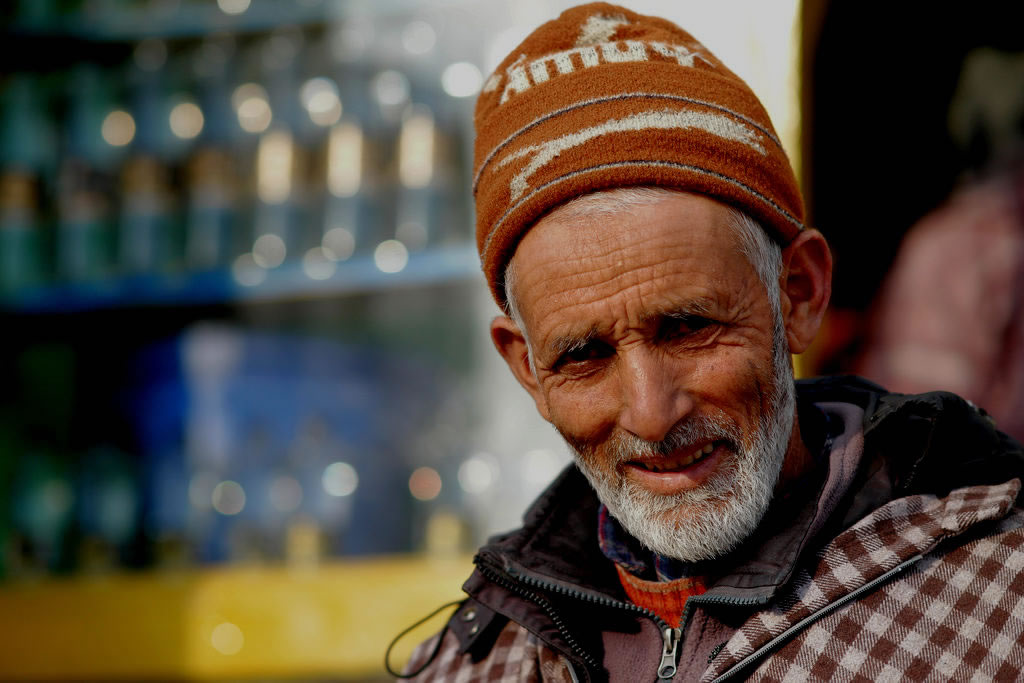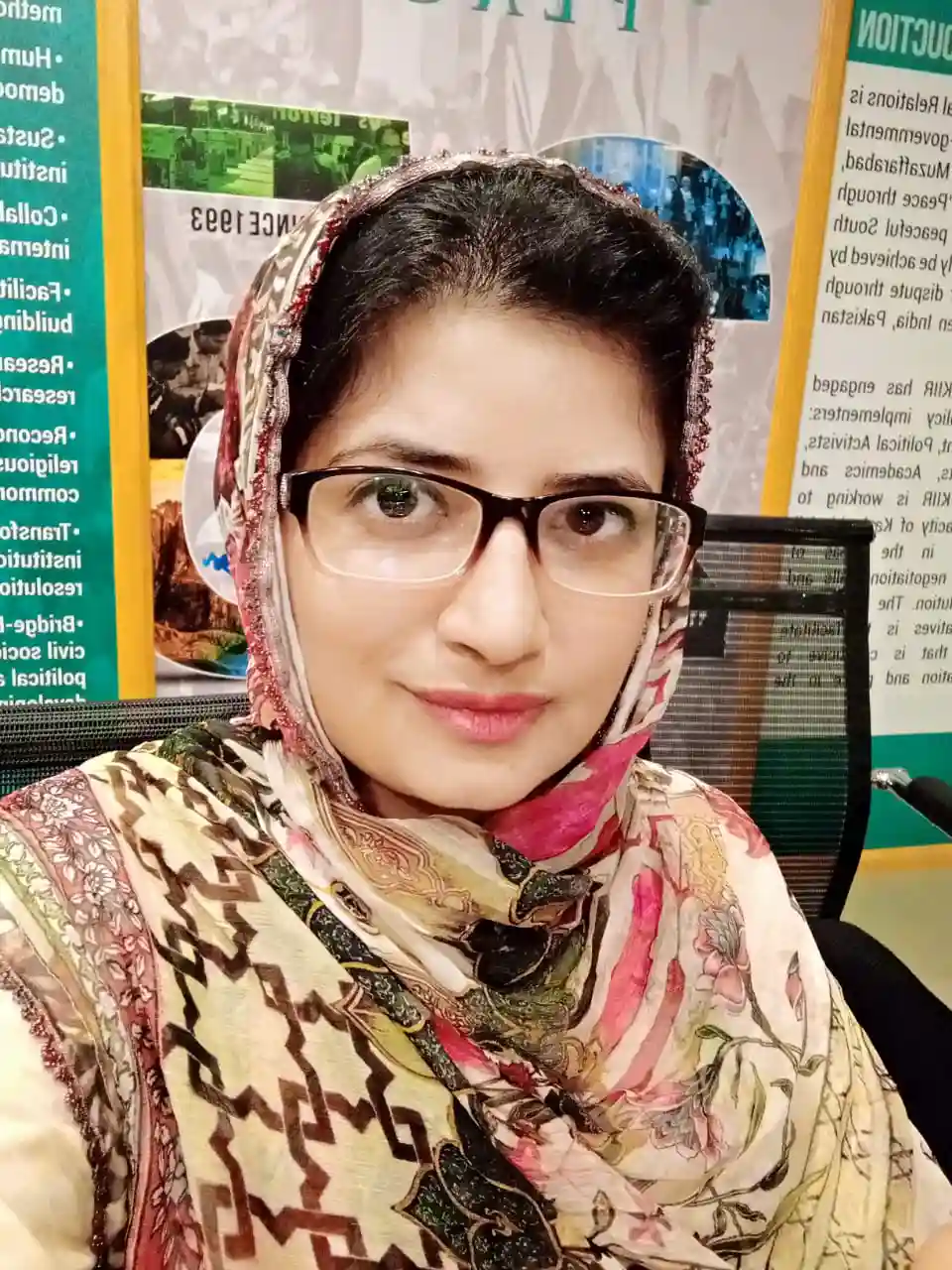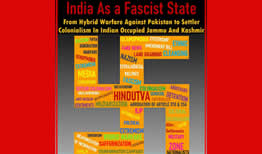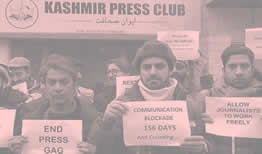Assessing the role of SCO and SAARC in providing humanitarian assistance in Jammu and Kashmir
Assessing the role of SCO and SAARC in providing humanitarian assistance in Jammu and Kashmir
Abstract:
This research paper evaluates the contribution of two regional organisations to humanitarian relief efforts in the conflict-ridden region of Jammu and Kashmir: the South Asian Association for Regional Cooperation (SAARC) and the Shanghai Cooperation Organisation (SCO). The protracted hostilities in Jammu and Kashmir, a long-running territorial dispute between India and Pakistan, have caused widespread violence, violations of human rights, and displacement. These issues have led to serious humanitarian crises. Given their geopolitical and strategic clout in South Asia, regional organisations such as the SCO and SAARC can be extremely important in addressing these humanitarian issues.
Ayesha Arshad
International Relations 4th Semester National Defense University
This paper investigates the
ways in which these organisation’s internal power dynamics influence their
strategies for humanitarian intervention in the area. China, Russia, India, and
Pakistan all have a significant impact on the SCO, which influences its
cautious approach and gives security considerations precedence over humanitarian
endeavours. Similarly, the long-standing rivalry between India and Pakistan
undermines SAARC's efficacy and keeps the group from taking a united stand on
the Kashmir dispute. In the midst of regional power struggles, this research
emphasises the difficulties and constraints both organisation’s face in
facilitating humanitarian aid, and it offers suggestions for improving their
roles in conflict resolution and humanitarian assistance in Jammu and Kashmir.
In the end, the study contends that in order for these organisations to have a
significant impact, they have to negotiate the intricate relationship between
local politics and prioritise humanitarian concerns over political interests.
Keywords:
Jammu and Kashmir, India, Pakistan, South Asia, SAARC (South Asian Association
for Regional Cooperation), Shanghai Cooperation Organisation (SCO), Regional
power dynamics
Introduction:
For more than 70 years, the Jammu and Kashmir region
has been the epicentre of a protracted conflict characterised by periods of extreme
violence, unrest in the political system, and dire humanitarian situations.
This dispute has remained a major point of contention between India and
Pakistan, who both claim the territory in its entirety but only administer
portions of it. It has its roots in the 1947 partition of British India. The
conflict, which started out as a territorial dispute, has since developed into
a complicated problem with political, religious, and ethnic overtones that has
a significant effect on the lives of the people living in Jammu and Kashmir.
International actors have taken notice of the humanitarian crisis in the
region, but more recently, regional organisations like the Shanghai Cooperation
Organisation (SCO) and South Asian Association for Regional Cooperation (SAARC)
have become important players in addressing the challenges posed by the
conflict.
Countless individuals are suffering as a result of
the conflict in Jammu and Kashmir. Many thousands of people have been killed
and been displaced as a result of decades of military operations, insurgencies,
and cross-border skirmishes. The majority of the violence has affected the
civilian population, who also suffer from limited access to essential services
like clean water, healthcare, and education, as well as violations of their
human rights and financial difficulties. The humanitarian crisis has been made
worse by the heavily militarised area, mobility restrictions, regular curfews,
and communication outages.
The situation has worsened since the Indian
government abrogated Article 370 in August 2019, revoking Jammu and Kashmir's
special autonomous status. Widespread discontent in the area accompanied this
move, which prompted a dramatic rise in military hostilities between India and
Pakistan. Since then, there has been a prolonged communications blackout, a
crackdown on civil liberties, and an increase in military presence in the area,
all of which have made it more difficult to provide humanitarian aid. Due in
large part to limitations placed in place by the governments engaged in the
conflict, international organisations and non-governmental organisations
operating in the region have encountered considerable difficulties in offering
assistance.
In this situation, addressing the ongoing humanitarian crisis requires the cooperation of regional powers and organisations. Humanitarian aid delivery in the region may be facilitated by regional organisations such as the SCO and SAARC, which have the capacity to mediate disputes and advance peace. Given the geopolitical sensitivity of the Kashmir conflict and the regional influence that neigh-boring nations like China and Pakistan retain, their involvement is especially crucial. Role of regional organisations in conflict zone:
“ The involvement of regional organizations in conflict resolution is crucial because they are closer to the problem and have a greater stake in the outcome” - Nelson Mandela
The comparative impacts of the South Asian
Association for Regional Cooperation (SAARC) and the Shanghai Cooperation
Organisation (SCO) have very different approaches to humanitarian strategies
when it relates to the stability and well-being of the people in Jammu and Kashmir.
Although both organisations are essential to regional diplomacy, there are
substantial differences in their efficacy and engagement in resolving the
humanitarian crisis in this war-torn area.
The founding of SAARC in 1985 aimed to promote
regional development and cooperation among the countries of South Asia.
Although the social development, environmental sustainability, and economic
cooperation are among its imperatives, it has had difficulty resolving regional
political disputes, such as the prolonged Kashmir dispute. The non-interference
principle underlying SAARC's structure restricts its capacity to get deeply
involved in domestic political disputes among its member nations. The
India-Pakistan rivalry, which rules South Asian politics and inhibits
coordinated action, has frequently compromised the organisation’s ability to
provide humanitarian aid. Its response to the situation in Jammu and Kashmir
has made this quite clear.
With little direct involvement in efforts to resolve
conflicts or provide humanitarian aid, SAARC has had little influence on the
well-being of the individuals living in Jammu and Kashmir. Due to member
states' veto power over cooperative initiatives, SAARC has not been able to
effectively act as a mediator for the ongoing conflict in the region, which
calls for significant political mediation. Due in large part to the fact that
India and Pakistan, the two main parties involved in the conflict, frequently
use their positions within SAARC to obstruct any actions deemed to be advantageous
to the other side, this has limited its ability to offer meaningful support to
Kashmiris. As a result, political unrest, human rights abuses, and economic
hardship persist in the region, and SAARC has not been able to offer a clear
and coherent plan for promoting peace or delivering humanitarian aid.
Conversely, the SCO, which was founded in 2001,
unites nations throughout Eurasia, including China, Russia, and a number of
Central Asian republics. In 2017, India and Pakistan became full members of the
SCO. Compared to SAARC, the SCO has taken a more forceful stance toward
regional security and stability, emphasizing economic cooperation,
counterterrorism, and regional security. The SCO has addressed regional
terrorism and extremism issues, but it has also come under criticism for
emphasizing state security over human security. This means that while it has
addressed these issues, it has not fully embraced the wider humanitarian
concerns of populations impacted by conflicts.
Regarding Jammu and Kashmir, the Shanghai
Corporation Organisation (SCO) supports India's argument that cross-border
terrorism arising from Pakistan is the main cause of instability in the area.
This may provide India with some diplomatic support, but it doesn't deal with
the fundamental humanitarian problems that Kashmiris face, like economic
hardship, political disenfranchisement, and violations of human rights.
Furthermore, the SCO has been unable to directly contribute to the resolution
of the Kashmir dispute or the provision of humanitarian aid due to its
non-interference principle and consensus-based decision-making process.
The SCO has
facilitated opportunities for dialogue between India and Pakistan, which is an
essential step toward lowering tensions in Jammu and Kashmir, despite its
narrow humanitarian focus. These possibilities, meanwhile, haven't produced any
tangible results that would elevate the living standards for the People of
Kashmir. The SCO member states'
geopolitical agendas frequently take precedence over humanitarian concerns;
this is evident in China and Russia's unwillingness to get involved in the
Kashmir dispute because of their own regional alliances and interests.
SCO & SAARC’s approach to regional security
and conflict resolution:
Humanitarian aid in Jammu and Kashmir is largely
provided by the cooperative efforts of regional organisations like the South
Asian Association for Regional Cooperation (SAARC) and the Shanghai Cooperation
Organisation (SCO). Although the goal of these organisations is to promote
development, stability, and peace in the region, the incredibly complex
geopolitical context of South Asia has an impact on their efficacy. This
research article investigates the ways in which the SCO and SAARC's involvement
helps or inhibits the provision of humanitarian aid in Jammu and Kashmir.
Member states have a platform to effectively
coordinate and mobilise resources through regional organisations such as SCO
and SAARC. One example of a counterterrorism measure that indirectly supports a
stable environment for the delivery of humanitarian aid is the Regional
Anti-Terrorist Structure (RATS) of the SCO. SAARC provides a framework for
coordinated responses to both natural and man-made disasters through its
Disaster Management Center, guaranteeing immediate help.
Strong member states' involvement in these
organisations—China and Russia in the SCO, for example—can apply diplomatic
pressure to speed up the delivery of aid. In order to negotiate access and
guarantee the security of aid workers, this political influence may be
crucially significant. Even though Indo-Pak tensions frequently hinder SAARC's
diplomatic efforts, sometimes these efforts result in bilateral agreements that
facilitate humanitarian operations.
However, the enduring rivalries among the member
states especially between India and Pakistan often interfere with these
organisations ability to function and impede productive cooperation. Indo-Pak
tensions severely limit SAARC's effectiveness by impeding joint initiatives and
consensus-building. The conflicting interests of China and Russia present
difficulties for the SCO, even though South Asian rivalries have less of an
impact on it.
The mandates and resources of both organisations are
insufficient to provide a comprehensive response to humanitarian crises. The
SAARC Secretariat is primarily dependent on the political will of its member
states, which is frequently lacking, and lacks the authority to enforce
decisions. Since SCO is primarily a security and economic organisation, its
influence during times of crisis is limited because it does not prioritise
humanitarian aid.
These
organisations' bureaucratic structures frequently cause delays in aid delivery
and decision-making. Because of SAARC's consensus-based methodology, aid
initiatives must have the support of all member states, which causes a delay in
responding to emergencies. Similarly, the implementation of aid programs may be
delayed and ineffective due to SCO's hierarchical decision-making process.
Humanitarian efforts may be complicated by the
participation of outside parties and the conditions placed on aid. Because of
its reliance on Chinese funding, the SCO frequently faces constraints that do
not meet Jammu and Kashmir's urgent needs. The reliance of SAARC on
international organisations and donor nations also brings in outside influences
that may compromise the impartiality and efficacy of aid delivery.
Challenges in collaboration: Differing mandates
and interests
Though to differing degrees of success, the SCO and
SAARC's policies have a significant influence on Jammu and Kashmir's stability.
The limited institutional mechanisms and non-interference principle of SAARC
severely restrict its capacity to impact regional stability. The organisation’s
emphasis on social and economic cooperation rather than addressing the
political causes of regional conflicts leaves Jammu and Kashmir's long-standing
problems without real solutions. One of SAARC's main concerns is the rivalry
between India and Pakistan, which keeps the group from promoting substantive
discussion or efforts at conflict resolution. Because SAARC has done little to
nothing to address the contentious issue of Kashmir, which further exacerbates
the mistrust and animosity between India and Pakistan, this paralysis
contributes to the region's ongoing instability.
On the other hand, the SCO has adopted a more
securitized stance toward stability in Jammu and Kashmir despite its larger
focus on regional security. Targeting terrorism, separatism, and
extremism—three themes central to India's narrative regarding regional
instability—is the SCO's Regional Anti-Terrorist Structure (RATS). Though the
SCO has made progress in counterterrorism cooperation, the fundamental causes
of instability in Kashmir, such as social inequality and political
disenfranchisement, are not addressed by its strategies; instead, they are more
in line with state-centric security concerns. The larger problems of
governance, human rights, and economic development go unaddressed when
humanitarian concerns are overlooked.
The SCO's emphasis on counterterrorism and
reluctance to get involved in domestic affairs have created a status quo where
state security is prioritised over human security. This strategy may strengthen
geopolitical stability, but it has little effect on deal with the repercussions
real experiences of Kashmiris who still have to from unresolved political
disputes. As a result, both organisations support a tenuous and fragmentary
stability that is unable to bring about lasting peace and prosperity for the
people of Jammu and Kashmir.
Power dynamics within SCO & SAARC and their
influence on Jammu and Kashmir:
Mainly focused on security, the Shanghai Cooperation
Organisation (SCO) brings together major regional powers such as China, Russia,
India, and Pakistan. The SCO's approach to humanitarian issues in the region is
directly impacted by the unique power dynamic created by the inclusion of
Pakistan and India, two states that are directly involved in the Kashmir
conflict.
China has substantial influence over the policies of
the SCO as a major participant in the organization. China has close
geopolitical and economic ties to Pakistan, including their cooperation on the
China-Pakistan Economic Corridor (CPEC), even though China maintains strategic
relations with both India and Pakistan. China has frequently backed Pakistan's
position on Kashmir as a result of this alignment, making it unlikely that the
SCO will adopt a neutral or India-friendly stance on the dispute. As a result,
China's influence restricts the SCO's ability to intervene humanitarianly in
Kashmir because the group generally refrains from taking any measures that
might upset the delicate power dynamics between India and Pakistan.
Russia, another important SCO member, and have long
had close relations with India. However, motivated by larger regional and
strategic interests, Russia has been trying more and more to strike a balance
in its relations with both Pakistan and India. Because of this delicate
balancing act, the SCO frequently takes a cautious stance on the Kashmir
dispute, putting security and counterterrorism cooperation ahead of directly
addressing humanitarian issues. The SCO's strategy for providing humanitarian
aid is influenced by its emphasis on counterterrorism. The group frequently
frames conflicts like the one in Kashmir within the larger framework of
terrorism and regional security. The emphasis placed on military and counterterrorism
measures over humanitarian interventions as a result of this security-oriented
viewpoint frequently makes it more difficult to deliver aid to affected
civilians. It is more difficult for the SCO to carry out humanitarian
operations in conflict areas like Kashmir because of its preference for state
sovereignty and non-interference, where any action could be perceived as taking
sides in a delicate territorial dispute.
The South Asian Association for Regional Cooperation
(SAARC) functions under a distinct set of dynamic due to the exclusive
membership countries i.e India and Pakistan.But SAARC's efficacy as a regional
organisation has been severely hampered by the long-standing rivalry between
these two nations, especially when it comes to resolving the Kashmir dispute.
The tense relationship between India and Pakistan
has frequently prevented SAARC from moving forward with its multilateral agenda
because of the bilateral tensions between them. Due to this rivalry, SAARC has
been unable to act jointly on Kashmir or carry out any significant humanitarian
projects in the area. For instance, tensions between India and Pakistan have
frequently caused SAARC summits and meetings to be canceled or rescheduled,
with both nations frequently using the platform to air their grievances rather
than engage in constructive
India's dominance in SAARC makes it more difficult
for the organization to deal with the humanitarian situation in Kashmir. Given
its size and strength, India has significant sway over the SAARC's agenda.
India has resisted any attempts by SAARC to intervene or facilitate
humanitarian aid in the region because of its stance on Kashmir, which it views
as an internal matter. India's emphasis on territorial integrity and state
sovereignty has frequently collided with Pakistan's demands for regional or
international mediation in Kashmir, leading to a deadlock within the
organization.
Further dividing the SAARC is the tendency of its smaller members—Nepal,
Bhutan, and Bangladesh—to align with either India or Pakistan according to
their own strategic interests. Because of this division among members, SAARC is
less effective in addressing the issue of humanitarian violations in Jammu and
Kashmir.
Conclusion:
The delivery of humanitarian aid in Jammu and Kashmir
has been both aided and hindered by the cooperative efforts of regional
organizations such as SCO and SAARC. Although they offer venues for
coordinating, mobilizing resources, and developing capacity, geopolitical
rivalries, constrained mandates, ineffective bureaucracy, and outside
influences frequently compromise their efficacy. In order to enhance the
efficacy of these organizations' humanitarian aid delivery functions, it is
imperative to tackle these obstacles and cultivate heightened collaboration and
political resolve among participating nations.
In conclusion, neither the SCO nor the SAARC have
been successful in promoting stability or providing appreciable humanitarian
aid in Jammu and Kashmir. Due to regional rivalries and a shaky institutional framework
that keeps it from resolving political disputes, SAARC is ineffective. Though
more successful in fostering regional security cooperation, the SCO has not
made humanitarian issues a priority on its agenda, and its engagement in the
Kashmir conflict is still centred on security issues rather than attending to
the needs of the local populace. The protracted conflict has left the people of
Jammu and Kashmir suffering, and neither organisation has been able to
significantly improve their lot in life. Addressing these issues requires a
more proactive and coordinated approach from the SCO and SAARC, with a focus on
political reconciliation and human security.
Both organisations must put humanitarian objectives
ahead of political differences in order to increase their efficacy. This could
entail settling internal disputes within SAARC to allow for cohesive action and
encouraging increased diplomatic engagement within the SCO to support
peace-building initiatives. In the end, improving regional cooperation is
necessary to lessen the humanitarian catastrophe in Jammu and Kashmir. In order
for the SCO and SAARC to effectively resolve conflicts, they must strike a
balance between their respective geopolitical objectives and the urgent need to
alleviate human suffering in the region.
Citations:
·
Soth Asian association for regional cooperation (SAARC) Disaster
Management Centre. (2020). Annual Report. Retrieved from SAARC DMC.
·
South Asian Association for Regional Cooperation (SAARC). (2019).
Organizational Structure and Challenges. Retrieved from SAARC Official Website.
·
Lanteigne, M. (2015). Chinese Foreign Policy: An Introduction. Routledge.
·
China’s Belt and Road Initiative: From the Inside Looking Out. Chatham
House.
·
Bhattacharjee, D (2015) South Asian Association for Regional Cooperation
SAARC: A Perspective.
·
External Influences on SAARC Humanitarian Efforts. Journal of
International Relations, 55-78.
Related Research Papers



























